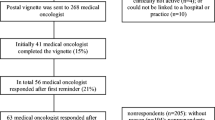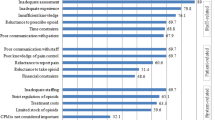Abstract
Purpose
To monitor oncologists’ perspective on cancer pain management.
Methods
An anonymized survey was conducted in two waves. First, over a convenience sample of oncologists known to be particularly concerned with the management of pain. Second, using a random sample of oncologists.
Results
In total, 73 and 82 oncologists participated in the first and second wave, respectively. Many oncologists reported to have good knowledge of analgesic drugs (95.9%), the mechanism of action of opioids (79.5%), and good skills to manage opioid-related bowel dysfunction (76.7%). Appropriate adjustment of background medication to manage breakthrough pain was reported by 95.5% of oncologists. Additionally, 87.7% (68.3% in the second wave, p = 0.035) of oncologists reported suitable opioid titration practices, and 90.4% reported to use co-adjuvant medications for neuropathic pain confidently. On the other hand, just 9.6% of oncologists participated in multidisciplinary pain management teams, and merely 30.3 and 27.1% reported to routinely collaborate with the Pain Clinics or involve other staff, respectively. Only 26.4% of the oncologists of the second wave gave priority to pain pathophysiology to decide therapies, and up to 75.6% reported difficulties in treating neuropathic pain. Significantly less oncologists of the second wave (82.9 vs. 94.5%, p = 0.001) used opioid rotation routinely.
Conclusions
Unlike in previous surveys, medical oncologists reported in general good knowledge and few perceived limitations and barriers for pain management. However, multi-disciplinary management and collaboration with other specialists are still uncommon. Oncologists’ commitment to optimize pain management seems important to improve and maintain good practices.

Similar content being viewed by others
References
Breivik H, Cherny N, Collett B, de Conno F, Filbet M, Foubert AJ, et al. Cancer-related pain: a pan-European survey of prevalence, treatment, and patient attitudes. Ann Oncol. 2009;20:1420–33.
van den Beuken-van Everdingen MH, Hochstenbach LM, Joosten EA, Tjan-Heijnen VC, Janssen DJ. Update on prevalence of pain in patients with cancer: systematic Review and Meta-Analysis. J Pain Symptom Manage. 2016;51(1070–90):e9.
Mantyh PW. Cancer pain and its impact on diagnosis, survival and quality of life. Nat Rev Neurosci. 2006;7:797–809.
Nekolaichuk C, Fainsinger RL, Lawlor P. Challenges of conducting research on cancer pain classification: how do we make sense of the outcomes? J Palliat Med. 2013;16:1323–5.
Fainsinger RL, Nekolaichuk CL. Cancer pain assessment—can we predict the need for specialist input? Eur J Cancer. 2008;44:1072–7.
Knopp KL, Nisenbaum ES, Arneric SP. Evolving cancer pain treatments: rational approaches to improve the quality of life for cancer patients. Curr Pharm Biotechnol. 2011;12:1627–43.
Kroenke K, Theobald D, Wu J, Loza JK, Carpenter JS, Tu W. The association of depression and pain with health-related quality of life, disability, and health care use in cancer patients. J Pain Symptom Manage. 2010;40:327–41.
Deandrea S, Montanari M, Moja L, Apolone G. Prevalence of undertreatment in cancer pain. A review of published literature. Ann Oncol. 2008;19:1985–91.
Greco MT, Roberto A, Corli O, Deandrea S, Bandieri E, Cavuto S, et al. Quality of cancer pain management: an update of a systematic review of undertreatment of patients with cancer. J Clin Oncol. 2014;32:4149–54.
Levy MH, Chwistek M, Mehta RS. Management of chronic pain in cancer survivors. Cancer J. 2008;14:401–9.
von Roenn JH, Cleeland CS, Gonin R, Hatfield AK, Pandya KJ. Physician attitudes and practice in cancer pain management. A survey from the Eastern Cooperative Oncology Group. Ann Intern Med. 1993;119:121–6.
Breuer B, Fleishman SB, Cruciani RA, Portenoy RK. Medical oncologists’ attitudes and practice in cancer pain management: a national survey. J Clin Oncol. 2011;29:4769–75.
Silvoniemi M, Vasankari T, Vahlberg T, Vuorinen E, Clemens KE, Salminen E. Physicians’ self-assessment of cancer pain treatment skills—more training required. Support Care Cancer. 2012;20:2747–53.
Anton A, Montalar J, Carulla J, Jara C, Batista N, Camps C, et al. Pain in clinical oncology: patient satisfaction with management of cancer pain. Eur J Pain. 2012;16:381–9.
Ferreira Azevedo Sao Leao. K, Kimura M, Jacobsen Teixeira M. The WHO analgesic ladder for cancer pain control, twenty years of use. How much pain relief does one get from using it? Support Care Cancer. 2006;14:1086–93.
Kwon JH. Overcoming barriers in cancer pain management. J Clin Oncol. 2014;32:1727–33.
Paice JA, Portenoy R, Lacchetti C, Campbell T, Cheville A, Citron M, et al. Management of chronic pain in survivors of adult cancers: American Society of Clinical Oncology Clinical Practice Guideline. J Clin Oncol. 2016;34:3325–45.
Liu WC, Zheng ZX, Tan KH, Meredith GJ. Multidimensional treatment of cancer pain. Curr Oncol Rep. 2017;19:10.
García-Pérez MA, Núñez-Antón V. Cellwise residual analysis in two-way contingency tables. Educ Psychol Meas. 2003;63:825–39.
Carulla Torrent J, Jara Sanchez C, Sanz Ortiz J, Batista Lopez N, Camps Herrero C, Cassinello Espinosa J, et al. Oncologists’ perceptions of cancer pain management in Spain: the real and the ideal. Eur J Pain. 2007;11:352–9.
Sapir R, Catane R, Strauss-Liviatan N, Cherny NI. Cancer pain: knowledge and attitudes of physicians in Israel. J Pain Symptom Manage. 1999;17:266–76.
Larue F, Colleau SM, Fontaine A, Brasseur L. Oncologists and primary care physicians’ attitudes toward pain control and morphine prescribing in France. Cancer. 1995;76:2375–82.
Kim YC, Ahn JS, Calimag MM, Chao TC, Ho KY, Tho LM, et al. Current practices in cancer pain management in Asia: a survey of patients and physicians across 10 countries. Cancer Med. 2015;4:1196–204.
Breuer B, Chang VT, Von Roenn JH, von Gunten C, Neugut AI, Kaplan R, et al. How well do medical oncologists manage chronic cancer pain? A national survey. Oncologist. 2015;20:202–9.
Eftekhar Z, Mohaghegh MA, Yarandi F, Eghtesadi-Araghi P, Moosavi-Jarahi A, Gilani MM, et al. Knowledge and attitudes of physicians in Iran with regard to chronic cancer pain. Asian Pac J Cancer Prev. 2007;8:383–6.
Escobar Alvarez Y, Rodriguez Sanchez CA, Caballero Martinez F, Recuero Cuervo V, Camps Herrero C. Professional survey on knowledge and clinical patterns of pain management in Spanish medical oncology. Clin Transl Oncol. 2010;12:819–24.
Gallagher R, Hawley P, Yeomans W. A survey of cancer pain management knowledge and attitudes of British Columbian physicians. Pain Res Manag. 2004;9:188–94.
Ger LP, Ho ST, Wang JJ. Physicians’ knowledge and attitudes toward the use of analgesics for cancer pain management: a survey of two medical centers in Taiwan. J Pain Symptom Manag. 2000;20:335–44.
Mystakidou K, Liossi C, Fragiadakis K, Georgaki S, Papadimitriou J. What do Greek physicians know about managing cancer pain? J Cancer Educ. 1998;13:39–42.
Yu S, Wang XS, Cheng Y, Yang J, Cleeland CS. Special aspects of cancer pain management in a Chinese general hospital. Eur J Pain. 2001;5(Suppl A):15–20.
Zhang Q, Yu C, Feng S, Yao W, Shi H, Zhao Y, et al. Physicians’ practice, attitudes toward, and knowledge of cancer pain management in China. Pain Med. 2015;16:2195–203.
Atasoy A, Bogdanovic G, Aladashvili A, Cvijetic Z, Dediu M, Cicmil-Saric N, et al. An international survey of practice patterns and difficulties in cancer pain management in Southeastern Europe: a Turkish & Balkan Oncology Group common initiative. J BUON. 2013;18:1082–7.
Ben Diane MK, Peretti-Watel P, Galinier A, Favre R, Obadia Y. Comite de pilotage Soins palliatifs P [Morphine prescription to terminal cancer patients suffering from severe pain: results of a French survey]. Bull Cancer. 2005;92:733–40.
Liu W, Xie S, Yue L, Liu J, Woo SM, Liu W, et al. Investigation and analysis of oncologists’ knowledge of morphine usage in cancer pain treatment. Onco Targets Ther. 2014;7:729–37.
te Boveldt N, Vernooij-Dassen M, Besse K, Vissers K, Engels Y. Adaptation of an evidence-based clinical practice guideline in cancer pain management by medical oncologists: a case vignette study. Support Care Cancer. 2015;23:1409–20.
Cherny NI, Catane R. European society of medical oncology taskforce on P, supportive C. Attitudes of medical oncologists toward palliative care for patients with advanced and incurable cancer: report on a survery by the European Society of Medical Oncology Taskforce on Palliative and Supportive Care. Cancer. 2003;98:2502–10.
Hilden JM, Emanuel EJ, Fairclough DL, Link MP, Foley KM, Clarridge BC, et al. Attitudes and practices among pediatric oncologists regarding end-of-life care: results of the 1998 American Society of Clinical Oncology survey. J Clin Oncol. 2001;19:205–12.
Luckett T, Davidson PM, Boyle F, Liauw W, Agar M, Green A, et al. Australian survey of current practice and guideline use in adult cancer pain assessment and management: perspectives of oncologists. Asia Pac J Clin Oncol. 2014;10:e99–107.
Zimmermann C, Swami N, Krzyzanowska M, Hannon B, Leighl N, Oza A, et al. Early palliative care for patients with advanced cancer: a cluster-randomised controlled trial. Lancet. 2014;383:1721–30.
Rogers MS, Todd C. Can cancer patients influence the pain agenda in oncology outpatient consultations? J Pain Symptom Manag. 2010;39:268–82.
Acknowledgements
The authors are grateful for the interest and time of the physicians who voluntarily contributed their opinions and data for this research. The authors also wish to thank Mar Serrano (Mundipharma, Madrid, Spain) and Jesús Villoria (Medicxact, S.L., Madrid, Spain) for preparing a draft of this manuscript, whose participation was funded by Mundipharma.
Author information
Authors and Affiliations
Contributions
All authors participated in the review and extraction of literature, design of the study, interpretation of results and preparation of the manuscript. All authors had full access to the data and have provided their final approval of the version of the manuscript to be submitted for publication.
Corresponding author
Ethics declarations
Conflict of interest
Authors received funds from Mundipharma Pharmaceuticals, S.L. for this research. JG-M, JdC, JC, RG, CJ, AL, CP, PS and J-JC declare no competing interests to declare. CA has been a consultant or has received fees for pharmacological training or congressional participation in the last 3 years of Adamed, Exeltis, Grünenthal, Ferrer, GSK, Janssen Cilag, Juste SAQF, Kyowa Kirin Pharmaceutical, Lundbeck, Mundipharma Pharmaceutical, Normon, Otsuka Pharmaceutical, Pfizer, Rovi, Rubió, Servier and Shire. ST has a full-time job at Mundipharma Pharmaceuticals, S.L.
Ethical approval
The manuscript does not contain clinical studies or patient data. According to Spanish regulations, neither approval from an Ethics Committee nor informed consent from patients were required, because all the data come from a survey of oncologists.
Funding sources
This research has received funds from Mundipharma Pharmaceuticals, S.L.
Rights and permissions
About this article
Cite this article
García-Mata, J., Álamo, C., de Castro, J. et al. A survey of perceptions, attitudes, knowledge and practices of medical oncologists about cancer pain management in Spain. Clin Transl Oncol 20, 1061–1071 (2018). https://doi.org/10.1007/s12094-017-1826-8
Received:
Accepted:
Published:
Issue Date:
DOI: https://doi.org/10.1007/s12094-017-1826-8




